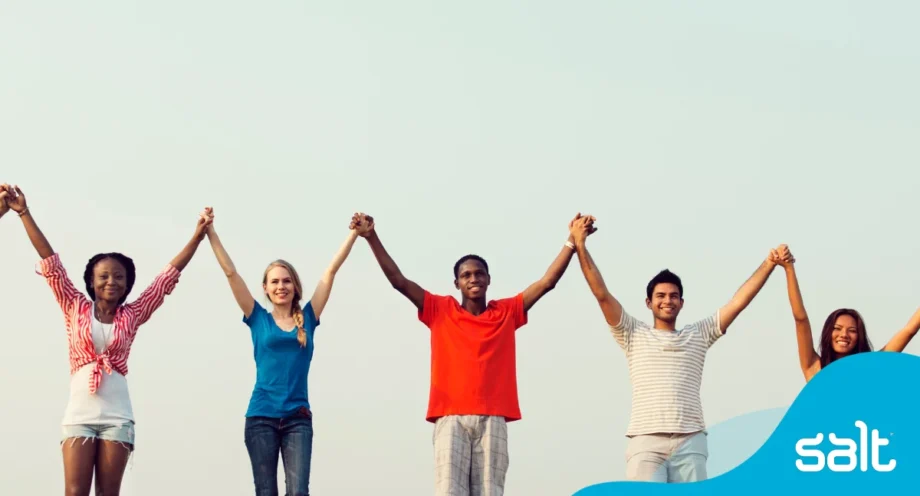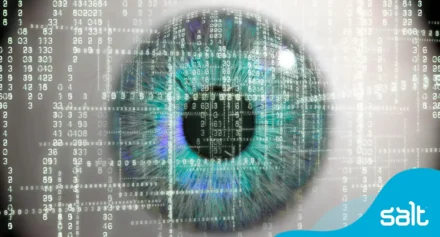7 key things to consider to be a better ally online and off
Allyship is easier than ever before with social media - but it's important to reflect on what's helpful, and your own role. Here are some ways you can be a better ally.

Everyone wants to live by their values and stand up for their beliefs. With social media, it’s easier than ever before to join the conversation and advocate for change.
But because it’s so easy to be an ally, it’s also easy to become part of a wider problem. A problem where marginalised voices must compete with allies (however well-meaning) to get the attention they deserve.
To support someone, you first need to learn and understand what help and support they’re asking for. You also need to reflect on your own role and privilege so you can act consciously and compassionately.
Our DEI Series aims to deliver thought-provoking and informative commentary about issues ranging from the workplace to our daily online and offline lives. Our next post in the series examines what to avoid to be a good ally on social media.
What is an ally?
An ally in this context is a person (or group of people) who supports a marginalised or mistreated group that they are not a member of.
This could mean supporting actions or individuals combating racism, sexism, homophobia, transphobia, xenophobia, ableism, ageism or discrimination of any kind.
Allyship is a broad term and while we can borrow a dictionary definition for it, what it looks like varies widely. Much like every individual is different, so is every ally.
While there are no set rules about how to be an ally, there are things that we can do to be supportive and respectful. We’ve collated some great ways to help you approach allyship — and what to avoid.
1. Reflect on why you want to be an ally
“Simply put, allyship is a powerful force for good.”
LeanIn.Org‘s Ally at Work training presentation
In their Ally at Work Training Presentation (free to download). LeanIn.org emphasises the importance of participants actively defining allyship for themselves and taking the time to think about what motivates them to help.
This thought process shouldn’t happen in a vacuum. If you’re unaffected by the discrimination you’re talking about, broaden your own understanding of the issues first.
Kenji Yoshino, NYU Law Professor and Director of the Centre for Diversity, Inclusion and Belonging, asks that allies consider our motivations towards every person in an allyship situation (the affected person, the source of discrimination, and yourself as an ally) before deciding how to act.
The first person to consider is yourself. In his LinkedIn course, he recommends asking yourself questions such as:
- “Do I have the proper motivations for stepping in as an ally?”
- “Am I informed enough to act?”
- “Have I considered my relationship to the affected person and the source [of the harmful behaviour]?”
Think honestly about whether you’re the right person to provide support or enact change. If it’s your best friend, you’re in an important position to support them. If it’s your boss, it might make sense to ask for support from elsewhere.
2. Think about the bigger picture
“So, the traditional way of looking at allyship kind of thinks of it as an on-off switch: either you’re an ally or you’re not. [The allyship model rethinks allyship] as more of an evolution or a journey.”
Kenji Yoshino
In his course ‘The Allyship Model’ with LinkedIn, Kenji Yoshino breaks down how this ‘on-off switch’ concept of allyship can prevent systemic change by distracting us from the bigger picture — a structurally discriminatory society that we’re all a part of, and that we’re all responsible for.
Allyship is a journey everyone is on. He reframes researcher Keith Edwards’s stages of growth for effective allies into three stages:
- Being an ally to an individual — supporting a marginalised person individually (like a mentor).
- Being an ally to some — supporting a particular marginalised group or groups.
- Being an ally to all — supporting efforts to sustainably change the system we’re all a part of.
Being an ally to an individual or being an ally to some are good starts, but for sustainable systemic change, we need to evaluate the bigger picture. We’ve all been raised in a biased society and, as a result, have internalised implicit biases. It’s crucial we continue to listen and to learn. Expect to get things wrong and keep that in mind when you call out another person for a mistake, or when you yourself are called out.
“A more generous, open, forgiving attitude towards others allows us to accept our own mistakes and engage in self-forgiveness and self-compassion and understand that our own mistakes, with regard to diversity and inclusion, are merely invitations to learn.” — Kenji Yoshino
Being an ally to all means that you commit to continually learning. You recognise your own role, and others’, as part of the current flawed system, and that recognition means you’re motivated to make changes that challenge our biases and exclusive structures for the better.
3. Listen and learn from others
Social media networks like LinkedIn put you in contact with a vast range of different people and organisations. Spend time listening and learning.
You’re responsible for your own learning. You don’t need to reach out to your existing friends, family members, or colleagues — and if you do, you should do this with care — to educate yourself about an issue. There are lots of newsletters, activists and educators active online which can help.
Social media is a powerful platform for raising awareness. Share posts you see that have valuable information and challenge biases. Things like data analysis and new reports, or stories from minority voices sharing their own experiences. Remember to verify your sources and think before you share.
4. Help amplify marginalised voices
While your own experiences are important, be conscious of not injecting them into a conversation unless you’re a part of it.
If you’re sharing something you’re proud of or that could help other allies, great! But make sure you check you’re not adding to the noise and diverting attention. Especially when posting online. Check you’re using appropriate hashtags and not appropriating hashtags activists or movements are using to drive action. For example, tagging black squares on Instagram as part of Black Lives Matter raised awareness but drowned out important voices and actions. Pascale Diverlus examined the aftermath of this for Refinery29 — and how performative allyship can distract allies from making meaningful change.
It’s important to stand up to abuse online and support anyone affected. Always report hate speech, crimes, and discriminatory behaviour to moderators.
You can also comment and add your voice to a conversation, but consider your actions first:
- Think about safety. Both your own and the person affected.
- Think about what the person affected is asking for. Don’t assume.
- Be conscious that the louder allies are, the more already marginalised voices can be drowned out.
- Be respectful of the space you’re in and lend support rather than demanding attention, amplifying voices rather than competing with them.
5. Challenge your own bias and your own motivations
Part of being an ‘ally for all’ is checking our own implicit biases. We all have them as we’ve all grown up in a society that privileges certain identities. Implicit biases are unconscious associations we have that change our perspective.
These biases influence who we choose to connect with, in ways we aren’t aware of. We can never understand what it feels like to occupy identities other than our own, which is why it’s important to actively seek out and listen to experiences that differ from yours.
Challenge yourself to connect with someone new every week. Search for connections, get to know people you work with, and recognize who you feel uncomfortable reaching out to and reflect on why. We should all strive to build diverse networks we can learn from and grow with.
6. Commit to listening and learning from everyone
Treat every connection as an individual. It’s tokenistic to get to know someone for their identity alone or treat them like they’re a representative. Not all differences are observable, so commit to listening and learning from everyone.
Be forgiving of yourself so you can grow. While you’re accountable for what you say and do, you’re also influenced by society, and you are going to have blind spots in your understanding of the world and others.
This is what’s powerful about Kenji Yoshino’s Allyship Model. If we see ourselves and others as on a journey, we’re able to better conceptualise that we’re all biased in ways we don’t know of, and that our mistakes are “invitations to learn”.
7. Back your words with action
Remember that you are part of the system that you’re criticising.
While we’re all accountable for our actions and decisions, it’s important to understand systemic and social pressures at work on ourselves as allies as well as on the affected people we’re trying to support.
Ask yourself:
- How might your own lifestyle affect the way you think about a situation?
- If you’re a leader or decision-maker, how does your own organisation behave concerning the issues you’re talking about?
- What actions can you put in place to support change, rather than criticise mistakes?
At Salt, we’re committed to making meaningful contributions to the communities and environments we operate in. Our teams around the world are taking ownership of our CSR initiatives and leading on projects that make a positive difference locally.
Our mission is to Create Futures. Both for individuals and for companies. Examining our own platform and power as a global recruitment consultancy is something we’re passionate about — striving to positively impact the digital economy.
Read and learn more about allyship
- Visit Kenji Yoshino’s website to see his books and works.
- TED has a whole series on allyship and inclusivity — How to Be a Better Human.
- Learn about the allyship model with LinkedIn’s free course.
- LeanIn.org has lots of free materials that break down allyship at work and how to get involved, including an amazing anti-racism library curated by their team.
- HBR article Be a Better Ally by Tsedale M. Melaku, Angie Beeman, David G. Smith, and W. Brad Johnson has lots of workplace and managerial advice.
- Listen to The Happiness Project podcast episode — How to be a better ally
- Frankie Dunn has an ongoing anti-racist reading list of books for white allies on VICE.
- Stonewall has a reading list for allies wanting to learn more about different parts of the LGBTQ+ community.
- Diversity Equality and Inclusion in Law has a wide-ranging reading list of fiction and non-fiction works about EDI, marginalised experiences and legislation.


